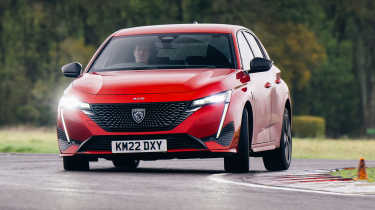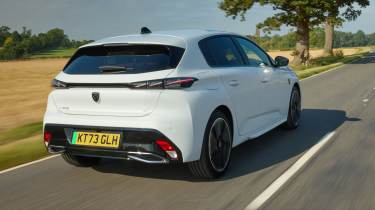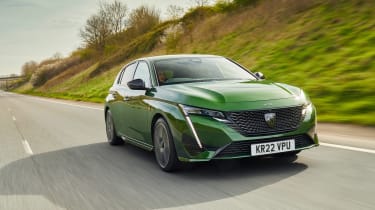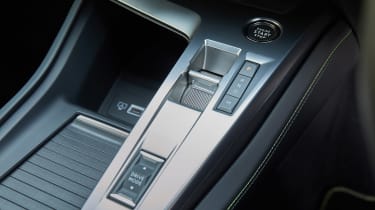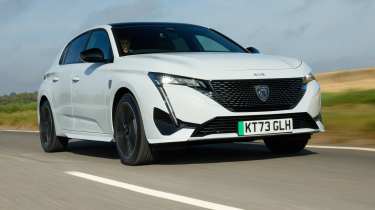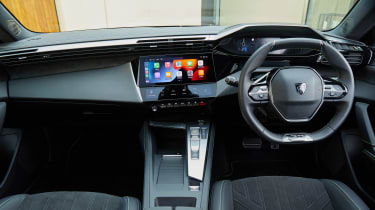Peugeot 308 2025 review – finally a match for the Volkswagen Golf?
Stylish, content heavy and good enough to drive, the 308 delivers on its remit, but it’s a thrill-free zone
There is no such thing as a Peugeot 308 GTi in 2025: that ended when the previous-generation 308 finished production four years ago. The flagship model for the current, sharp-suited 308 family is badged GT, and it’s worth acknowledging early doors that this car makes no pretence of being a successor to the GTi. It’s a GT in name and in ethos.
One look at the current 308 and first impressions are good, as atop a relatively mundane set of proportions is a highly detailed, ornate and yes, quite premium-looking hatchback – whatever that means. Designed under the supervision of former Peugeot designer Gilles Vidal, the 308’s detailing is an exercise in more is more, with fine brightwork, daytime running lighting structures and some very complex-looking lamp internals that make a Golf look like it’s undergone a German austerity programme. The effect is certainly arresting, and even if you can’t get over the new branding, there’s no doubt Peugeot is working hard on making the new 308 as desirable as a medium-sized family hatchback gets.
> Volkswagen Golf Mk8.5 2024 review – a return to form for the hatchback benchmark?
What also makes the 308 so desirable is the availability of a vast range of powertrain options, something that very few (or any) of its rivals do. Today, the hatchback is available with a choice of hybrid petrol, plug-in hybrid petrol, diesel and even a full-electric e308 variant, catering to just about every prospective buyer – whether or not it can also cater to a keen driver, though, is what we’re about to find out.
Engine, gearbox and 0-62mph time
Peugeot’s relatively successful ‘premium’ efforts start to lose their lustre when you actually start to drive the thing. We’ll come to the EV later, but the engine range is varied, made up of a 130bhp 1.2-litre turbocharged petrol, 129bhp 1.5-litre diesel and two 1.6-litre petrol plug-in hybrids with 178bhp and 222bhp. The turbo petrol is very refined, and despite having a tiny power output, the 308’s impressively lithe 1288kg kerb weight and a decent chunk of low-down torque make it just about keep up with traffic. All 308s, regardless of powertrain, feature an eight-speed torque-converter automatic, and while just about fine when mooching around at low speeds, can feel clunky and unresponsive unless you take control via the steering wheel-mounted paddles.
More reviews
The Vauxhall Astra GSe is the hybrid 308's sibling, and the pair are very nearly identical twins. Same plug-in hybrid powertrain, with a 1.6-litre four-cylinder engine plus an electric motor fed by a 12kWh battery to give a 222bhp total. If the battery is fully topped up, a 37-mile electric driving range is possible. An eight-speed auto is the only gearbox choice.
The combined motor and engine can punt the 308 GT along at a good lick, and with a soft suspension set-up it possesses a supple, loping gait in the manner of more than a few older Peugeot models. Less enjoyably, brake pedal feel is soft too, and the brakes can be difficult to modulate – whether the powertrain is in its regular Drive mode or ‘B’ mode, which adds additional regenerative braking from the e‑motor to partially recharge the battery when you lift from the throttle.
Where it’s becoming commonplace for manufacturers to be offering plug-in hybrid powertrains, the ability to make them drive naturally is the challenge, and it’s one that Peugeot hasn’t quite nailed with the 308. In all-electric mode the 308 is typically smooth and very refined, and when the petrol motor is called on there’s very little aurally to communicate that to you, but in terms of response from the throttle pedal, things start to go a little all over the place.
The drivetrain’s latency that’s present in all models is not hidden away within the hybrid’s complex arrangement, making the process of accelerating a jerky affair. You can’t really hear this indecision in the transmission, engine and electric motor, but you can certainly feel it, the engine often pulling all sorts of weird rev movements that appear to have nothing to do with your right foot. The process wouldn’t be so distracting if the car accelerated in a linear fashion, but it doesn’t, often giving you more or less performance than required, and often changing its mind in the process.
> Peugeot 208 2025 review – a fine alternative to the Ford Fiesta
The brakes have a similar problem, as the calibration of the regenerative and friction braking is very poor, with the initial tip-in point of the brake pedal never being where you left it. It makes the car jump on the brakes with too much vigour, or more worryingly, without enough bite every time you hit the pedal. Even with one consistent pedal application from high speeds, the braking force changes constantly, and sometimes requires you to chase the pedal as you’re coming to a complete stop. It’s not reassuring at low speeds, and feels quite problematic when driving faster.
Opt for the all-electric e308 and there’s just one powertrain of choice, pairing a relatively modest 54kWh battery pack with a 154bhp front-mounted electric motor (torque stands at 199lb ft). Unlike some EVs, it’s not quick, with 0-62mph said to come in 9.8sec and top speed at 106mph. Even from a standstill and at low, in-town speeds, initial acceleration is tame and tapers further towards the national speed limit, but then this does help it achieve decent 4-mile/kWh efficiency for a quoted 267-mile WLTP combined range – faster charging capabilities would be appreciated though, with maximum charging speeds of 100kW lagging behind some current rivals.
Ride and handling
While the base cars are impressively light, hybrids pack on an extra 300kg, making any semblance of agility disappear. When driving at speed, the chassis is merely fine. The steering is fast in ratio, but light in feel and can sometimes feel a little difficult to read when at high speeds, while the chassis has a safe understeer-led balance – as you would rightly expect. The suspension is certainly on the softer side, and even on the GT’s 18-inch wheels does ride very well, but comes with a compromise to outright body control. A Ford Focus or Volkswagen Golf finds a better balance between control and finesse.
But there is a ray of light in the 308. It's 20mm lower than the last model and still has an inherently light chassis, but one that’s stiffer and more dimensionally stable than before. It all adds up to a strong base for what could be a brilliant new GTi. Yes, the plug-in hybrid PSE brand will be the only plausible high-performance 308 in Peugeot’s product plan, but if the previous 308 GTi by Peugeot Sport was anything to go by, a new generation with this car’s inherent chassis improvements paired to its brilliant design and interior could be a winner – if only Peugeot had the inclination to build it.
The all-electric model feels a little busier on some roads than its combustion-only counterparts, perhaps a result of the added weight, but spring rate remains slow and on most roads, it’s a comfortable ride. Unlike the combustion car, brakes are easy to modulate, with the blend between regenerative braking and friction brakes well calibrated.
The steering feels responsive because of Peugeot’s trademark small steering wheel, but it isn’t any more so than that of most cars. You can disable the traction control (presumably to help you get out of a muddy car park or similar) but it switches itself back on again above 30mph. Not a deal-breaker but it’s indicative of the car’s approach. With 199lb ft to the front wheels and its EV-specific Michelin E Primacy tyres, the e308 does have a tendency to understeer much sooner than you’d expect, which can be frustrating.
The 308 doesn’t feel at all like a hot hatch; it is definitely a GT. Which is fine, it’s not fibbing. In many ways, it’s an entirely pleasant car, and for buyers for whom a plug-in hybrid might fit their routine, it’s well worth a look. But it’s not a driver’s car.
Interior and tech
While it’s not quite as dramatic as in the smaller 208, it’s technology – rather than design – that defines the experience. Although it shares much with the Vauxhall Astra, the 308’s interior is the more special environment of the two, with plusher materials and more design flair. In fact, it feels more special than that of many more upmarket cars from other manufacturers.
There’s no traditional rev counter in the striking, holographic-effect instrument panel, something of a cardinal sin for a warm hatch – the dash is also blocked by the squared-off steering wheel depending on your seating position, which is somewhat of a design flaw. It also misses a snappy gear change (pull the paddles and there’s not much of a noticeable response) and lacks communication from all the touchpoints: steering, pedals and seat.
The trick interior design might look the part, but in everyday life it can prove frustrating to navigate. While Apple CarPlay/Android Auto will save the day for most circumstances, the infotainment UI is one of the most unintuitive we’ve experienced in a modern car. In the all-electric e308, road noise is also more noticeable than we’ve come to expect from a car without an engine, but strong overall build quality helps make up for this.
Price, specs and rivals
The final element of the Peugeot 308’s upmarket ambitions come clear when you look at the prices. The entry-level car starts at a reasonable £31,820, but dig into the hybrid and all-electric models and you can specify your 308 GT up and over £40,000. Yes, there’s a lot of content involved, but that’s a huge sum to spend on any medium-sized French family hatchback.
Volkswagen’s Golf is priced at around the same points up and down the range, with the GTE equivalent to the top-spec hybrid GT Premium specification. The Golf is marginally less expensive, and comes with an extra 20bhp, but it isn’t as well equipped. Ford doesn’t offer a PHEV Focus, but it is still a strong rival at the lower end of the Peugeot’s range. Plug-in Audi A3s are about the same price model-for-model as the VW, making them cheaper than the Peugeots, and significantly so when purchased on a PCP on account of the Audi’s stronger resale values.
The all-electric e308 starts from £37,850 in 2025, lower than its price at launch, with the more premium GT trim coming with more standard kit for £40,100 (our test car was optioned to £44,500). Most of the 308’s rivals don’t come with a pure-electric alternative, but the likes of the Volkswagen ID.3 and Cupra Born are priced from £30,850 and £35,495 respectively – while they cost less, they do come with less kit as standard in their most basic forms.
